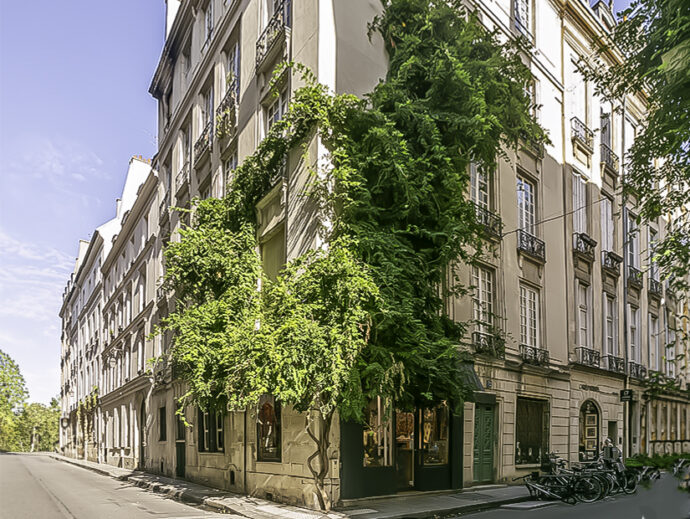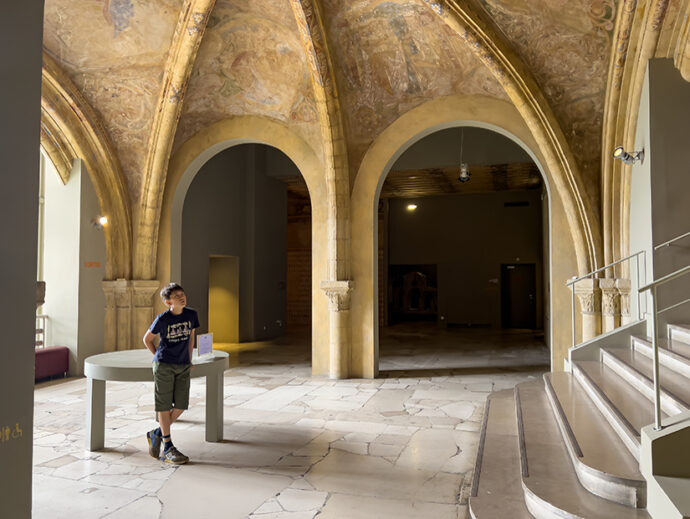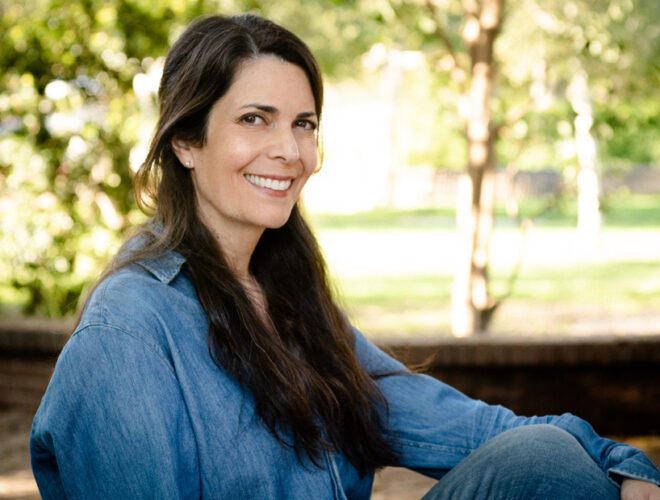
Landscape: ‘springful’ peek at the Tour Eiffel buds in the background ready to bloom, Jardin du Trocadéro
Tour Eiffel, Place de la Concorde, Jardin des Tuileries
Landscape of Springtime: one of the subjects French poetry has looked at the most is springtime. As the season of renewal it claims one of the most inspirational times of our year.

Landscape: springtime trees trimmed for space to renew growth, vue of Place de Concord, Jardin des Tuileries

Landscape: one blooming tree in the Spring, Jardin des Tuileries
Central Paris
Landscape of springtime: the Jardin des Tuileries, premier arrondissement located between the Louvre Palace, Rue de Rivoli, Place de la Concorde and the Seine. It occupies the old Tuileries district, named for the tile factories that occupied its location in the Middle Ages. Today, these factories have given way to a vast and elegant public garden. It is one of the most extensive and ancient French-style gardens in the capital. Parisiens form a part of the graceful and easy landscape of this magnificent Royal garden.

Landscape: another perspective, spring planting at Waldeck Rousseau Monument, Jardin des Tuileries
The monument to Waldeck-Rousseau by Laurent-Honoré Marqueste (1848-1920) includes a bust of Waldeck-Rousseau and a group of three people in marble.

Landscape: expanse as a vast dessert; bare tree, spot shade, visitors enjoy the spotted space and the sun alongside the small stylish flower bed
Springtime, our intermediate space between the cold of winter and the heat waves of summer, spring always is filled with never-denied promises. Nature is reborn; her beings chirp, sing and frolic in search of new loves with hope and faith! We all feel a little lighter at heart, to witness the ambiance teeming with the sense of potential and renewed life.

Landscape: ever expanse of solitude for reading, new sculpted section, Jardin des Tuileries
French poetry has long been one of the most appreciated literary forms with historical longevity from the middle Ages. There is certainly no limit to the impressive poetry that comes from the Francophone world.

Statue of an elegant classical woman accompanies three modern girlfriends, Jardin des Tuileries
So, while you’re planting your spring garden, leave some moments and use this post to plant some new French words into your vocabulary.

Landscape: close yet unknown to one another near the trickling water of the fountain, Jardin des Tuileries
As the flowers emerge, so shall your words engage the interest of your ‘entourage’!
After all, 30% to 60% of English originates from French.

Happy boys, photographed in the garden, Jardin des Tuileries

Garden Party, Champagne apéro, Jardin des Tuileries
From the Volume, «Les Fleurs du Mal« Les Fleurs du mal includes nearly all of Baudelaire’s poetry, written starting in 1840, first published in 1857 and ending with his death in 1867. Below is one of his famous poems and perhaps the best summation of a Spring in Paris.
Charles Baudelaire, (9 April, 1821 – 31 August, 1867)
PAYSAGE (listen)
“Je veux, pour composer chastement mes églogues,
Coucher auprès du ciel, comme les astrologues,
Et, voisin des clochers écouter en rêvant
Leurs hymnes solennels emportés par le vent.
Les deux mains au menton, du haut de ma mansarde,
Je verrai l’atelier qui chante et qui bavarde ;
Les tuyaux, les clochers, ces mâts de la cité,
Et les grands ciels qui font rêver d’éternité.
II est doux, à travers les brumes, de voir naître
L’étoile dans l’azur, la lampe à la fenêtre
Les fleuves de charbon monter au firmament
Et la lune verser son pâle enchantement.
Je verrai les printemps, les étés, les automnes ;
Et quand viendra l’hiver aux neiges monotones,
Je fermerai partout portières et volets
Pour bâtir dans la nuit mes féeriques palais.
Alors je rêverai des horizons bleuâtres,
Des jardins, des jets d’eau pleurant dans les albâtres,
Des baisers, des oiseaux chantant soir et matin,
Et tout ce que l’Idylle a de plus enfantin.
L’Emeute, tempêtant vainement à ma vitre,
Ne fera pas lever mon front de mon pupitre ;
Car je serai plongé dans cette volupté
D’évoquer le Printemps avec ma volonté,
De tirer un soleil de mon coeur, et de faire
De mes pensers brûlants une tiède atmosphère.”
— Charles Baudelaire
Translation: Landscape
I would, to compose my eclogues chastely,
Lie down close to the sky like an astrologer,
And, near the church towers, listen while I dream
To their solemn anthems borne to me by the wind.
My chin cupped in both hands, high up in my garret
I shall see the workshops where they chatter and sing,
The chimneys, the belfries, those masts of the city,
And the skies that make one dream of eternity.
It is sweet, through the mist, to see the stars
Appear in the heavens, the lamps in the windows,
The streams of smoke rise in the firmament
And the moon spread out her pale enchantment.
I shall see the springtimes, the summers, the autumns;
And when winter comes with its monotonous snow,
I shall close all the shutters and draw all the drapes
So I can build at night my fairy palaces.
Then I shall dream of pale blue horizons, gardens,
Fountains weeping into alabaster basins,
Of kisses, of birds singing morning and evening,
And of all that is most childlike in the Idyll.
Riot, storming vainly at my window,
Will not make me raise my head from my desk,
For I shall be plunged in the voluptuousness
Of evoking the Springtime with my will alone,
Of drawing forth a sun from my heart, and making
Of my burning thoughts a warm atmosphere.
— William Aggeler, The Flowers of Evil (Fresno, CA: Academy Library Guild, 1954)
*




